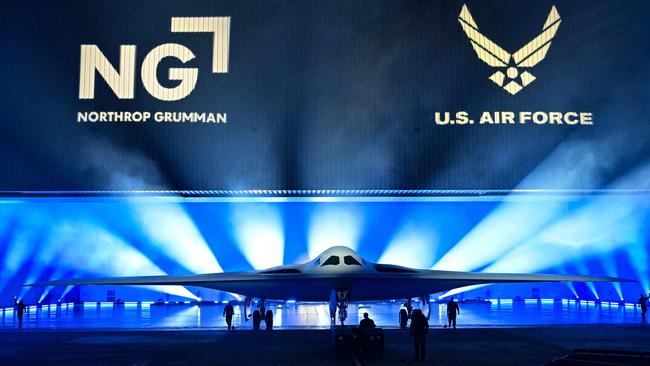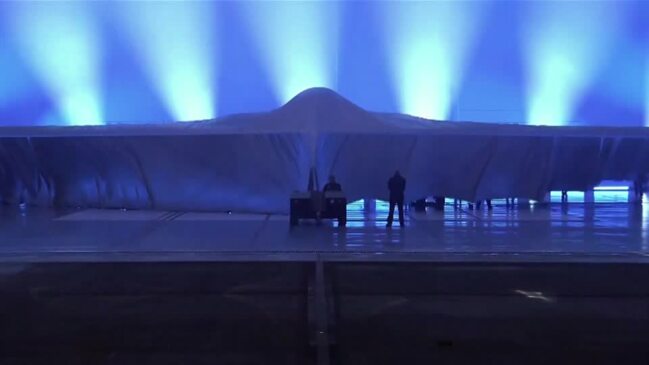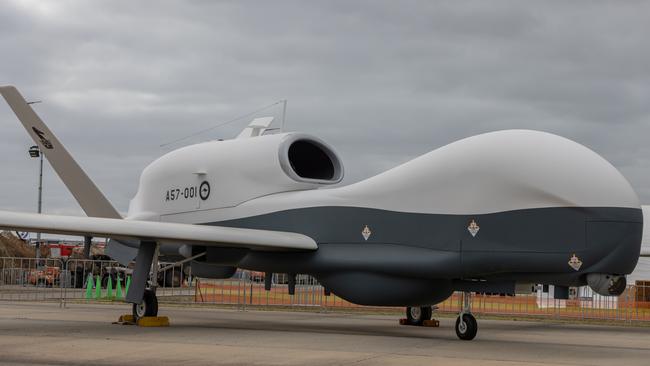AUKUS opens Australia to giant defence deals with US
Australia is now a core partner in the US-led strategy to boost long-range firepower to deter Chinese aggression in the Indo-Pacific, according to the head of Northrop Grumman.

Australia is now a core partner in the US-led strategy to boost long-range firepower to deter Chinese aggression in the Indo-Pacific, according to the head of global defence giant Northrop Grumman.
Kathy Warden, president and chief executive of Northrop, says the AUKUS nuclear submarine plan has not only bolstered Australia’s deterrence posture but has also opened up multi-billion-dollar opportunities for two-way investment between the US defence industrial base and Australia.
Northrop, one of the world’s largest defence companies, will play a key role in helping to deliver a raft of long-range military capabilities for Australia, from Virginia-class nuclear subs, to giant unmanned Triton MQ-4C maritime surveillance drones and possibly B-21 stealth bombers.
Ms Warden is in Australia, where she has met with Defence Minister Richard Marles, Defence Industry Minister Pat Conroy and senior defence leaders to map out future multi-billion-dollar investments under both AUKUS and the Defence Strategic Review.

“We are a leader in strategic deterrence … so we will be involved in pillar one of AUKUS,” Ms Warden told The Weekend Australian.
“We are a key supplier on the (nuclear submarines) through the Virginia-class submarine and so we will be a part of the US capability delivery. We also are a partner with BAE (Systems) on the Astute-class (submarine). We are committed to the partnership with the Australian government in both developing and delivering capabilities.”
Ms Warden said both Australia and the US were increasingly speaking with a united voice on the strategic threat posed by China in the region.

“There’s clear alignment … to really emphasise power projection in the region in the form of strategic deterrence,” she said.
“To see that kind of alignment is very important. The national defence strategy of the US prominently places our allies at the core of that deterrence strategy with China, and I expect the (Defence) Strategic Review and Australia will echo those sentiments.”
Ms Warden said she had spoken with Mr Marles about Northrop’s newly unveiled B-21 stealth bomber which some have speculated might one day be purchased by Australia to give it long-range aerial strike capability. However, the possible purchase of the B-21 is not expected to be a part of the DSR to be released next month.
Mr Warden said that as the B-21 continued to be developed, the US would get a better idea about costs, capability and whether the next-generation bomber would be made available to close allies like Australia.

Northrop is hoping the DSR confirms the purchase of more Triton MQ-4C maritime surveillance drones to upgrade Australia’s ability to gather intelligence and surveillance in the region.
The government has committed $US333m ($500m) to purchase three of the maritime drones, which can collect intelligence for more than 24 hours at a time at over 16,700m with an operating range of more than 8000 nautical miles.
It is considering purchasing another four of the Triton drones.
“We believe that Triton provides not just an important ISR (intelligence) capability for national security, which is the primary intention, but also for tracking fishing lanes and tracking climate. There’s so many applications,” Ms Warden said.
Northrop helps to produce the propulsion systems and launch tubes for the Virginia-class submarines that Australia will purchase as part of the AUKUS plan.








To join the conversation, please log in. Don't have an account? Register
Join the conversation, you are commenting as Logout